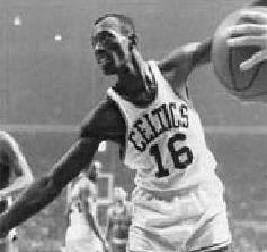Long before rebounding maniac Dennis Rodman brought his troubled, Bad Boy image to championship teams in Detroit and Chicago, another forward from another era was pulling down rebounds and winning championships (eight in all) with tremendous athleticism, style and grace. Long before Michael Cooper enhanced his reputation as a preeminent defender by sticking to Larry Bird like glue, another player was busy building a reputation of his own with stellar, all-around defensive play. He was the player asked to do the dirty work, to put the clamps on the likes of Elgin Baylor, Bob Pettit, Dolph Schayes, and Rick Barry. He was the player who operated below the radar, his star eclipsed by such Boston Celtic luminaries as Bill Russell, Bob Cousy and Sam Jones. His name is Tom “Satch” Sanders, and you would be hard-pressed to name a finer all-around defensive forward in NBA history.
Satch Sanders played 13 seasons for the Boston Celtics. He was the perfect compliment to Russell, Cousy and the other higher-profile Celtics, a player who understood his role and immersed himself in it perfectly. He was a superbly conditioned athlete and, as this interview illustrates, an equally cerebral athlete. Sanders, along with Russell and K.C. Jones, formed a defensive triumvirate that was the heart and soul of the Celtics’ championship success.
Sanders, who borrowed his nickname from the great Negro League pitcher Satchel Paige, played the majority of his basketball career during America’s turbulent sixties. Whether holding court with President John F. Kennedy or confronting racism in the south, Sanders was a man unafraid to make a statement. Perhaps the most famous example of this came during the 1961 NBA season, when he and the other African-American members of the Celtics refused to play a game in Lexington, Kentucky. Upon arriving for an exhibition in honor of Celtic teammate Frank Ramsey, Sanders and his black teammates learned that the hotels were segregated. When they were denied service in the hotel coffee shop, Sanders, Russell, Sam and K.C. Jones (no relation) discussed the situation among themselves and decided not to play. While Boston Celtics coach Red Auerbach tried to talk them out of it, he was also the one who smartly acquiesced and drove them to the airport. The issue gained national attention and struck an important blow for racial equality.
Today, Sanders is very much an integral part of the National Basketball Association. Sanders is a socially conscious intellectual, a former Ivy League head coach, the founder of the NBA Rookie Transition Program, and currently the NBA Vice President for Player Programs.









